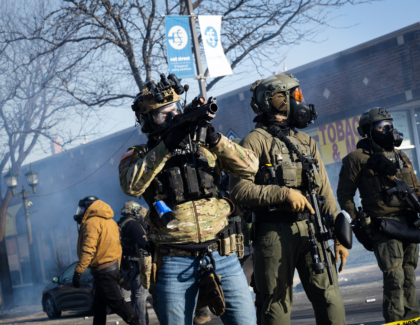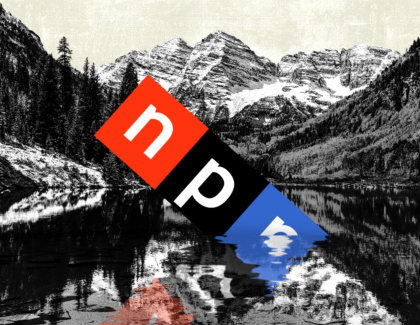Sign up for the daily CJR newsletter.
It’s difficult to sum up the main themes of a conference like the International Journalism Festival, in part because it is so vast. One of the oldest and largest journalism conferences, it takes place in Perugia, a small town two hours north of Rome that probably peaked in popularity sometime in the 3rd century BC, when it was the capital of the Etruscan empire. The conference lasts for five days and involves more than 400 speakers, almost 300 panels, and events in a dozen different locations in Perugia’s historic district (it’s also free of charge to all attendees). The Sala dei Notari, one of the venues in the old city’s central Palazzo, was already almost 150 years old when a guy named Johannes Gutenberg figured out how to use an old wine press to print books.
Some of the panels and keynotes were of interest primarily to European journalists, such as a panel on “The End of Italian Football,” or one on “The Infiltration of the Belgian Far Right,” but the vast majority explored universal topics such as investigative journalism, harassment of journalists, innovation, censorship, fake news, and the need to find new business models. Membership came up frequently during discussions of the latter, as did public funding models, an approach that is far more common in Europe, where the German TV industry alone is given more than $10 billion in tax revenue annually. And the rise of the far-right seemed to be a central concern for many journalists, who felt that Facebook in particular was helping to foment anti-immigrant and anti-globalist sentiment around the world.
Not surprisingly, for a European conference, there was more talk of Brexit than there was of Trump, but there were also discussions about how Trump had helped influence and even inspire would-be dictators like Viktor Orban in Hungary, Recep Erdogan in Turkey—where more than 150 journalists remain in prison—and Rodrigo Duterte in the Philippines. Duterte’s nemesis, journalist Maria Ressa, gave a standing-room-only keynote about the mission of journalism, and appeared on panels about entrepreneurship and crowdsourcing. She was arrested by the Duterte government for the fourth time just before the festival. The fact that Ressa, an independent journalist, seemed to be persevering in her fight against a brutal regime was celebrated by almost everyone present, but there was also an undercurrent of fear that her battle might end badly, given the fact that Duterte’s attacks continue to escalate.
Another popular topic of conversation, both on panels and over gelato in the public square and beer in the hotel bar, was the influence tech giants such as Google and Facebook are having on the media industry and on journalism. In some cases, representatives from the platforms even took part in these discussions, as with a panel hosted by CUNY journalism professor Jeff Jarvis entitled “Criticize Facebook? Sure. Leave? Why?” The panel featured Jesper Doub, a former Der Spiegel journalist and now Facebook’s director of news partnerships for the EMEA region, who argued that his employer cares deeply about quality journalism and wants to help newsrooms figure out how to use Facebook better. But many of those in attendance seemed skeptical of the social-networking giant’s sincerity. “I trust Facebook about as far as I could throw it,” said one journalist at the Jarvis panel.
There seemed to be significantly more skepticism about the platforms than in previous years, including some criticism about the fact that both Google and Facebook were prominent sponsors of the festival (as they have been for several years). The printed program had two full-page ads for the Facebook Journalism Project and the Google News Initiative, video clips of Google News head Richard Gingras played before some of the sessions, and Olivia Ma of the Google News Initiative gave a relatively sparsely-attended presentation. Each of the platforms also hosted panels and workshops about their various media-related projects, and put on social events at the main conference hotel with free drinks and appetizers, where journalists criticized their commitment to journalism while happily consuming their food.
The conference came to a close with a gripping address by Parkland school shooting survivors David Hogg and Jaclyn Corbin. Hogg spoke about how he had planned to become a journalist, and how journalists needed to stand up for truth, and challenge politicians on why they haven’t moved on gun legislation. “When you as journalists are talking about gun violence, or any kind of violence, or really any other issues, talk to the people that are actually affected and listen, especially with young people,” Hogg said. “Don’t write them off because they are young.” Maltese journalist Matthew Caruana Galizia also gave a keynote about his work in journalism and how it has changed since his mother—investigative journalist and activist Daphne Caruana Galizia—was killed by a car bomb in 2017.
One of the main benefits of the Perugia festival is that, unlike so many North American media industry conferences, it provides a sense of what is happening outside the United States. It was instructive to see and hear from working journalists not just in Britain but in half a dozen other countries suffering from strongman-style politics and attacks on the press. No one came up with any solutions to this problem, but it was comforting just to know that others share our pain, and are also fighting to protect and defend the practice of journalism.
Correction: An earlier version of this post said that Google and Facebook sponsored the International Journalism Festival for the first time this year, but they have both been sponsors for the past three years.
Has America ever needed a media defender more than now? Help us by joining CJR today.






